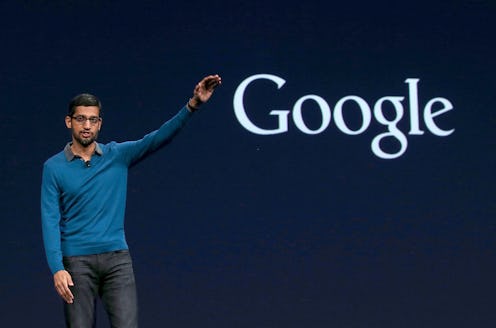News
So Do We Have To 'Ask Alphabet' Now?
Google co-founder Larry Page threw everyone a curveball on Monday when he announced a major company reorganization — but how is Alphabet different from Google? For all intents and purposes, Alphabet, the new parent organization, basically is Google. Alphabet will now be run by Page and Google's other co-founder Sergey Brin, and together they will oversee Google and several other corporations. In short, Google is now Alphabet, and Alphabet owns Google.
As far as we know it, Google will not change. All the web services will still be under the Google company, which means that Gmail, Google Docs, Google Maps, and Google Search will all stay the same. So will Google advertising as well as Android and YouTube. All of these services will stay as part of the Google company and will be overseen by new Google CEO Sundar Pichai. Although not as well known as Page and Brin, Pichai is often recognized for his push to produce Google Chrome.
Google will be the largest subsidiary of the new Alphabet company. But other projects will be shifted away from Google and put into the hands of Alphabet. According to Page, the company has become "diverse and sprawling" since its inception as a search engine.
There are a lot of projects that will be pulled out from under Google, however, such as Calico, a biotech research project that focuses on combating aging. The life sciences division, which has produced products like contact lenses for diabetics, will be positioned under Alphabet. Nest, which makes WiFi-controlled thermostats and security systems will also be separated along with Fiber, which provides high speed internet.
Google Ventures; Google Capital, the investment branches of the company; and Google X, the experimental research lab that has worked on self-driving cars and delivery drones, will join the new Alphabet as subsidiaries. According to Page, the new structure will allow these individual companies to grow and flourish, while allowing Page and Brin greater oversight.
It also allows the founders to expand their horizons and try new things. "We've long believed that over time companies tend to get comfortable doing the same thing, just making incremental changes," Page said. "But in the technology industry, where revolutionary ideas drive the next big growth areas, you need to be a bit uncomfortable to stay relevant."
The change will allow Pichai to focus on expanding Google's web applications, while leaving Brin and Page the opportunity to pursue larger and more nebulous concepts. Which will probably be a relief for Google investors. According to The New York Times, some investors have worried that projects like Google Plus floundered as Page and Brin were too busy focusing on drones and Google Glass.
Now, however, Google will be its own entity, completely dedicated to doing what it does best. And there's even more good news for investors: All Google shares will immediately convert into Alphabet stock. Since the announcement, after-hours trading show Google (soon to be Alphabet) stock rising rapidly. It may have been a confusing and shocking announcement, but Alphabet may very well have been the best decision for Google.
